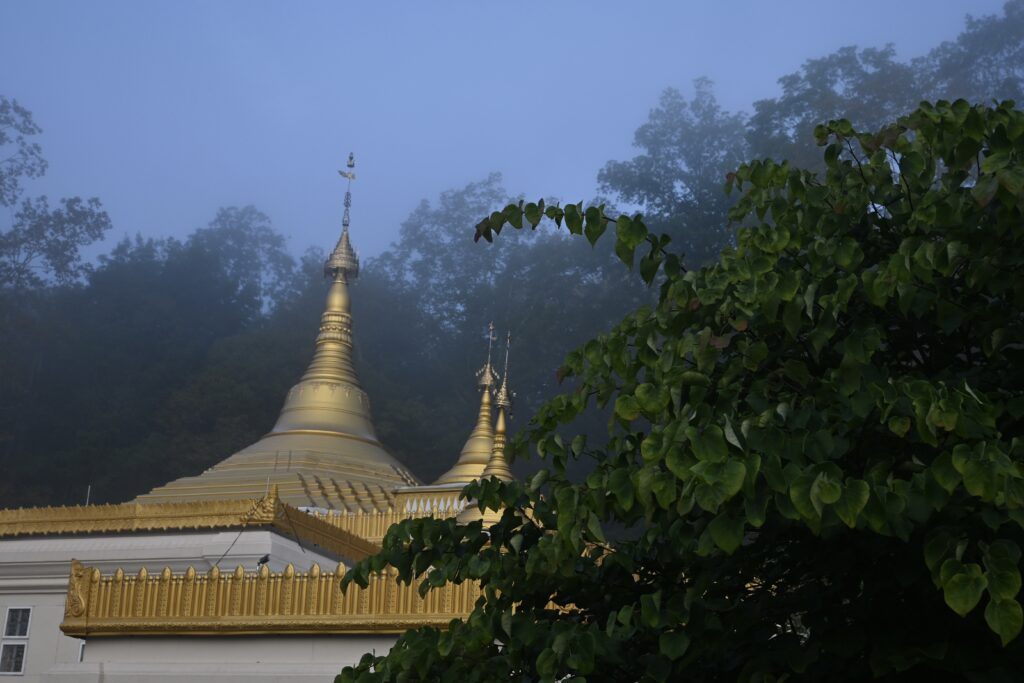When I walked into the Dhamma Dhara Vipassana Meditation Center in Shelburne Falls, MA last summer, I had absolutely no idea how much influence that Vipassana (insight) meditation is about to bring to my life. After my first ten-day silent Vipassana course taught by S.N. Goenka, I have become much calmer in the face of stress; at the same time, my interests in Buddhist philosophy and the mechanisms behind Vipassana meditation have also grown tremendously. To learn more about related topics, I have conducted an interview with Lysha, a senior Assistant Teacher at Dhamma Dhara Vipassana Meditation Center. In this interview (audio can be found at the end of this article), we have discussed the following questions.

The first line of questions pertain to the commercialization of mindfulness techniques by many mediation practitioners, which is a phenomenon happening in the Western world and especially in the United States. To spread meditation practice and make a profit from teaching meditation is to market meditation as a product for people to consume. In doing so, these practitioners not only hide or blur the Buddhist origin of the mediation technique but also charge people for retreats. However, for Vipassana as taught by S.N. Goenka, such a commercialization of meditation is at least against one of the fundamental philosophies in Vipassana and Buddhism – the notion of non-self.
The fundamental issue is that when people pay fees for meditation courses and retreats, which include lodging and meals at the retreat center, they develop a deep-seated sense of ownership and entitlement. For the duration of the course, they perceive the meditation techniques they learn, the center facilities they utilize, and the food they consume as belongings they have rightfully purchased with their fees. Essentially, everything offered at the center becomes part of their perceived possessions by virtue of their payment. This fosters a mentality of clinging to the notion of self, which directly contradicts the core teachings of non-attachment and non-self in Vipassana meditation and Buddhism. This is exactly why Vipassana meditation centers founded by S.N. Goenka only accepts voluntary donations from participants at the end of the course. Selfless service is emphasized and recommended, and gratitude for other people’s selfless service will be cultivated.

When questioned about why S.N. Goenka’s approach to Vipassana meditation is not strictly bound to its Theravada Buddhist lineage, Lysha explained that doing so could potentially exclude individuals from diverse religious and cultural backgrounds who hold differing beliefs. The Four Noble Truths teach that suffering is a universal human experience, and that there exists a path to liberation from suffering. By welcoming people of all backgrounds to learn this universal technique for ending suffering, it does not imply that the Theravada lineage is unimportant. Rather, it acknowledges that the Theravada lineage should not be a barrier preventing those from diverse backgrounds from finding freedom from their own suffering.
In the latter half of the interview, we examined more philosophical questions regarding the Buddhist view of the world. According to Lysha, the Ultimate Truth is ineffable and can only be experienced; every time a person describes the Ultimate Truth, they are never able to fully describe it since some core pieces are lost in the process of communication. During the practice of Vipassana, through feeling the rising and passing of different sensations without reactions, one is able to realize the changing and empty nature of dharmas at an experiential level, which is central to Ultimate Truth.

I then asked Lysha the question of whether Ultimate Truth itself changes over time depending on varying experiences people have in their meditation practice. Lysha said it is not the Ultimate Truth itself that is changing over time but our relationship to the Ultimate Truth, among which, it is our understanding of the Ultimate Truth that is changing.
Further, from my interpretation of Lysha’s words, I consider Vipassana meditation practitioners to hold a rather anti-realist view of the reality: the external reality is composed of five aggregates (form, feeling, perception, fabrications and consciousness), and it is our interaction with the five aggregates that form our experience of the reality. The reason why I describe this view as anti-realist instead of strictly idealist or mind-only (as Yogacara Buddhists proposed) is because from our conversation, it is unclear whether Vipassana meditation practitioners think the external world independently exists outside of our perceived external reality. However, I do find that the concept of non-duality of subject/object is shared in both Yogacara Buddhism and Vipassana meditation: through the realization that our worldly experience is shaped by our mind, the internal world and the external world are essentially both products of consciousness. Hence, they are no longer in duality.